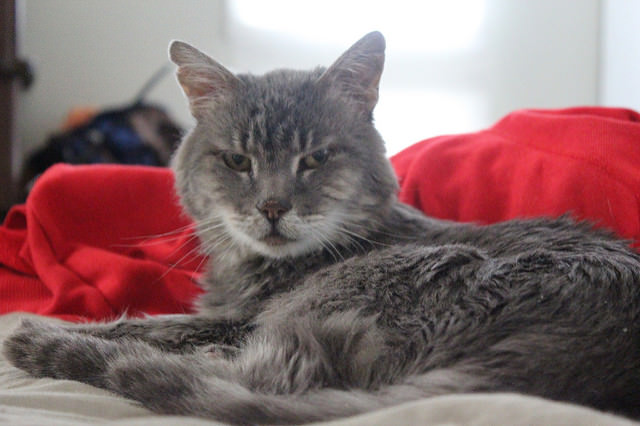You know your senior cat better than anyone. You’ve probably had her with you for years. But since you see her every day, you might not notice changes in her body weight.
The trouble is that sometimes minor changes in weight can be a hint at bigger problems. Because of the types of health issues that are more common in senior cats, weight loss is more often a complaint than weight gain (although there are problems that might present themselves as an increase in weight, like fluid retention). Any change in your cat’s overall body condition is worth mentioning to your veterinarian.
Even though it can be more difficult to tell when your cat gradually loses weight, weight loss can be a sign of trouble. Some of these troubles are serious and some are more manageable. You will need a vet’s help to decide what is going on with your own cat and he/she will suggest some diagnostic testing.

Here are 3 things that weight loss can mean:
1. Diabetes (persistently elevated blood sugar) will certainly cause a cat to be unable to maintain a healthy body weight. Diabetes can wreak havoc on other systems in your cat’s body and must be diagnosed and treated to avoid becoming life-threatening. Other signs that your cat could be suffering from diabetes include: increased thirst, increased appetite, and excessive urination (maybe not always going in the litter box could be sign).
2. Renal disease (kidney compromise) can also cause weight loss. The kidneys serve to remove toxins from the blood. Many of these toxins come from the normal breakdown of food. It is the job of the kidneys to filter them out and when the kidneys are not functioning normally, they can build up and cause problems. Cats suffering from renal disease can also drink a lot and urinate too much, but they also often show a decreased appetite +/- vomiting and diarrhea.
3. Hyperthyroidism is another common issue for senior cats. In these cases, the thyroid hormone that helps regulate metabolism will be in higher than normal amounts. These cats will be ravenously hungry yet still lose weight. Sometimes they will act very active and vomit occasionally too. As many as 1 in 10 cats over the age of 10 years can expect to have hyperthyroidism1.
These three common and important issues are not the only causes of weight loss in cats. These three are easily detected with simple blood tests. Do not be afraid to see the vet if you notice your cat is feeling and looking thinner. Get to the bottom of it and remember, since you see her every day, you might not notice subtle changes. Make sure that your cat sees a vet at least once yearly so her body weight can be accurately measured and tracked.
Do you love cats? Want to learn more about them? Find me on Facebook by clicking here.
- Peterson ME. Hyperthyroidism in cats: what’s causing this epidemic of thyroid disease and can we prevent it?J Feline Med Surg 2012;14: 804–818.

